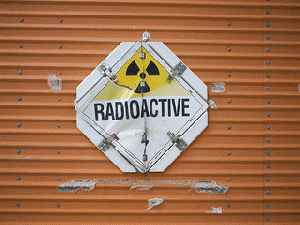The single most important news story of the day--the one most likely to still be affecting lives in 10 or even 100 years--was buried on page A13 of the New York Times. The Wall Street Journal didn't cover it all, nor did Yahoo! News or Google News. A search of Google News yielded a mere 199 or 353 stories about it, depending on which search terms you entered. Those numbers are pittances compared to the hundreds of thousands and sometimes million of stories produced by searches for skirmishes in the Middle East or the marriage of celebrities.
Yet there is no doubt in my mind that it is the most important news event of the week, because it will have the greatest long-term impact on our people and our economy. And the impact will all be bad!
I'm talking about the decision of the Nuclear Regulatory Commission (NRC for "not real careful") to allow nuclear power plants to permanently store the highly radioactive spent nuclear fuel rods above ground in guarded containers. This unanimous decision by the NRC removes a major barrier for the nuclear power industry, which can now build new plants and expand old ones.
It's bad news for people because using nuclear power to generate electricity is a dangerous process. Accidents can cause increases in early deaths for decades to come.
And it's also bad news for the economy, because the money spent to build new nuclear power plants will not be spent to develop solar and wind energy.
Some of the spent fuel has a half life of 25,000 years. That means it takes 25,000 years for half of its radioactivity to dissipate. What an arrogant and ignorant assumption the Obama NRC is making to assume that sentient beings will be able to guard and maintain the radioactive cesspools inside containers for hundreds of thousands of years, ten times the length of recorded history. How many societies will come and go in that time? How many mutations of language will occur? How likely will it be that after a social upheaval or a natural disaster the survivors will forget the location of the containers and what's inside them? Take a look at the oldest identifiable human settlements and your answers to my questions may unsettle you.
Of course, what the Obama NRC is really doing is kicking the can down the road, leaving it to future generations to solve the problem of permanently storing nuclear waste in a safe manner. But what if we never do? Or we do only after a number of accidents that cost thousands of lives and trillions of dollars? And let's not forget that the future generations that are supposed to figure out how to safely store nuclear waste will also be focused on global warming, a crumbled infrastructure of roads, mass transit and bridges, oil shortages and immigration reform.
The nuclear power generating industry has been grappling with the problem of waste storage since its inception after World War II. Ideas for permanent storage such as underground or in caverns have met with disapproval from the public and regulators. Above-ground storage in containers has up to now been a temporary solution. One of the major reasons that no new nuclear power plants have been built in the United States since 1977, although the Obama NRC approved construction of four new ones two years ago.
I keep calling it the "Obama NRC" because our current president placed all the current the commissioners but one on the commission; the other one Obama re-nominated after she served one term. The Obama administration has proven to be vehement in its support of increasing our use of this dangerous energy source that only produces electricity.
Nothing has changed--the containers are no safer than they were before the Obama NRC made its decision. But by substituting one word for another--"temporary" to "permanent"--the NRC is pointing the United States down a path that has already proven to be disastrous.
So I guess your mother was wrong when told you that, while sticks and stones will break your bones, words will never harm you." Calling above-ground containers "permanent" will harm lots of people.






